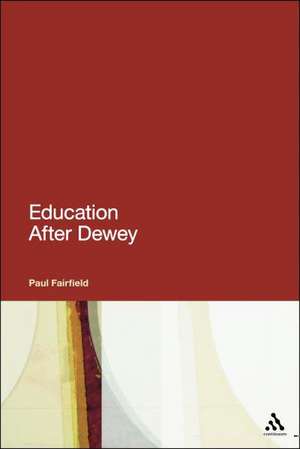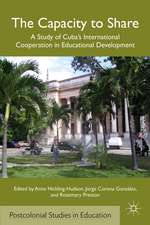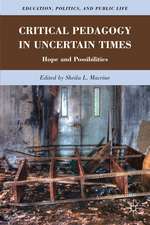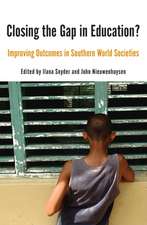Education After Dewey
Autor Professor Paul Fairfielden Limba Engleză Hardback – 11 oct 2009
Preț: 1067.69 lei
Preț vechi: 1241.50 lei
-14% Nou
Puncte Express: 1602
Preț estimativ în valută:
204.37€ • 222.06$ • 171.78£
204.37€ • 222.06$ • 171.78£
Carte tipărită la comandă
Livrare economică 21 aprilie-05 mai
Preluare comenzi: 021 569.72.76
Specificații
ISBN-13: 9781441145864
ISBN-10: 1441145869
Pagini: 320
Dimensiuni: 156 x 234 x 25 mm
Greutate: 0.61 kg
Editura: Bloomsbury Publishing
Colecția Continuum
Locul publicării:London, United Kingdom
ISBN-10: 1441145869
Pagini: 320
Dimensiuni: 156 x 234 x 25 mm
Greutate: 0.61 kg
Editura: Bloomsbury Publishing
Colecția Continuum
Locul publicării:London, United Kingdom
Caracteristici
Assesses
the
relevance
of
Deweyâ?Ts
philosophy
of
education
by
bringing
it
into
critical
contact
with
the
thought
of
several
major
figures
in
continental
philosophy.
Cuprins
Introduction:
An
Enigmatic
Transition
\Part
I:
The
Educative
Process\
1.
Beyond
Progressivism
and
Conservatism
\
2.
Dewey's
Copernican
Revolution
\
3.
What
Is
Called
Thinking?
\Part
II:
Education
in
the
Human
Sciences\
4.
Teaching
Philosophy:
The
Scholastic
and
the
Thinker
\
5.
Teaching
Religion:
Spiritual
Training
or
Indoctrination?
\
6.
Teaching
Ethics:
From
Moralism
to
Experimentalism
\
7.
Teaching
Politics:
Training
for
Democratic
Citizenship
\
8.
Teaching
History:
The
Past
and
the
Present
\
9.
Teaching
Literature:
Life
and
Narrative
\
Index
Recenzii
'Fairfield
offers
a
veritable
feast
of
fresh
insights
into
the
relations
between
Dewey's
educational
philosophy
and
the
work
of
the
major
figures
of
the
continental
tradition,
and
his
chapters
on
the
hot-button
issues
of
ethics,
religion,
and
politics
in
the
classroom
provide
much
needed
guidance
to
teachers
at
every
academic
level.'
Larry
A.
Hickman,
Director
of
the
Center
for
Dewey
Studies
and
Professor
of
Philosophy,
Southern
Illinois
University
Carbondale,
USA
'John Dewey is one of the most controversial educational thinkers of the last century. Some have believed that his philosophy, with its emphasis upon the gradual transformation of the child's experience, is central to the reform of education for everyone. Others claim that his so-called child-centred education has been the cause of all our problems. But few have read him and most have misunderstood him. This book takes up the message of the real Dewey in going "beyond progressivism and conservativism". In so doing, it takes up some of the main themes of Dewey's philosophy and, in a similar vein, transcends the dualism which bedevils educational thinking and policy. It is a most important contribution to the growing interest in what Dewey really argued.' Richard Pring, Lead Director of the Nuffield Review 14-19 Education and Training, UK, and Professor of Education, Department of Education, University of Oxford, UK
'John Dewey is one of the most controversial educational thinkers of the last century. Some have believed that his philosophy, with its emphasis upon the gradual transformation of the child's experience, is central to the reform of education for everyone. Others claim that his so-called child-centred education has been the cause of all our problems. But few have read him and most have misunderstood him. This book takes up the message of the real Dewey in going "beyond progressivism and conservativism". In so doing, it takes up some of the main themes of Dewey's philosophy and, in a similar vein, transcends the dualism which bedevils educational thinking and policy. It is a most important contribution to the growing interest in what Dewey really argued.' Richard Pring, Lead Director of the Nuffield Review 14-19 Education and Training, UK, and Professor of Education, Department of Education, University of Oxford, UK










